
Understand Hoarding
Hoarding is more than just clutter. Individuals with hoarding disorder have an ongoing problem getting rid of possessions. They believe they need to save them, regardless of actual value. The thought of getting rid of possessions causes extreme distress. As a result, items pile up over a period of years, often making it difficult to function in daily life. A 2015 survey showed that seven percent of Americans consider themselves to be a hoarder and half of Americans know a hoarder. All kinds of people are hoarders, but sadly, many people mistakenly consider hoarders to be lazy, dirty, greedy, or selfish.
Putting a hoarder’s home on the market presents some possible difficulties. Today, most home buyers shop for a new house online, so photos are extremely important. Pictures of a hoarder’s home are not likely to entice buyers. Another common sales tool, the open house, can be hard under the best of circumstances. In the case of a hoarder’s home, an open house may be impossible. People may be unable to walk around in the house, reluctant to bring their children inside the house, or even unable to open the door. In the event that prospective buyers come inside the home, they may make disparaging or disrespectful comments which may be very upsetting to the owner.
People with hoarding disorder fall on a spectrum, from mild to severe. The more severe the problem, the more impact it has on an individual’s life. Over time, it may affect their health, finances, and relationships. When it becomes necessary to sell a hoarder’s home, many challenges present themselves. It is vital for the hoarder and those helping to have a realistic understanding of the potential hurdles, and that despite the condition of the house, the house can be sold.
Establish ownership
If you are assisting a friend or family member with selling the home, first make sure they have a legal right to sell the home. In some cases, a hoarder may be only living in the house because family members are trying to provide lodging. Or, the house may be tied up in a trust. Such circumstances need to be dealt with before the house can be sold.
Cleaning challenges
Do not underestimate the amount of cleaning that needs to be done. It probably cannot be accomplished with a group of family, friends, and neighbors, no matter how intentioned. Usually, even local home cleaning services will not and should not take it on. Only extreme cleaning professionals will have the skills and equipment to tackle the job.
When you first see a hoarder’s home, you are probably just seeing the top layer of trash. But beneath the piles of trash or newspapers, there are layers of problems that have accumulated, probably for years. Laundry, moldy food, black mold, animal droppings and even animal remains. Both the surfaces and the air are unhygienic, to say the least, and probably toxic. Because everything needs to be handled with caution and disposed of properly, only cleaners who specialize in these types of hazards can do the job. It will cost more than using volunteer helpers, but it will be worth it.
When cleaning out a hoarder’s house, everything might look like trash, but there may be valuable items hidden in the trash piles. These may be family keepsakes, or they may be items of monetary value. If there are items which can be sold, the money can be used to help the owner or facilitate the sale.
When setting goals for the cleanup, it is best to set several smaller, reasonable deadlines. A general deadline, such as it must be done in the next two weeks, is likely to fail.
Be aware of damage and repair costs
Cleaning will only address surface issues. Most people need to do some repairs when selling a house. Most people with hoarding disorder, however, need many repairs done. In most cases, a hoarder has probably neglected to do even basic maintenance to keep a house in good condition. It is impossible to know the extent of the damage until the cleaning process reveals it. Maintenance issues that have been ignored can be dangerous to the individual’s health. Broken bathroom facilities can lead to mold and other problems. Damaged or missing smoke alarms can be deadly if there is a fire. Inspections may also reveal structural damage, as well as plumbing and electrical problems.
No matter how much they need the help, unfortunately, most individuals with hoarding disorder refuse to let anyone, including repairmen, into their home. They may be embarrassed, ashamed, or just intensely private. So repair problems continue to mount up, existing problems get worse, and the cost of repairs increases. Avoid hiding or ignoring damage. Potential buyers for a hoarder’s home will be anticipating damage, and it is best to handle the necessary repairs upfront. This also means you will have paperwork or other proof of recent repairs.
Time
Time is essential when it comes to selling a hoarder’s home. Based on the condition of the house, the owner may need to move out as soon as possible for health reasons. He may be behind on his mortgage payments or under threat of eviction by the city. The individual may need the money badly and wants to sell my house fast Los Angeles. It takes a huge amount of time and effort to get such a house ready for sale.
Selling a home and moving is hard for anyone, but even harder for a hoarder. Someone with hoarding disorder may be overwhelmed and unable to make decisions. In some cases, people simply choose not to invest the time and money in preparing the house. They just want a quick sale with minimal stress.
Contact Seller’s Advantage reviews online (https://www.sellersadvantage.com/contact/) or call us at 1-800-208-3243 to get a no-cost, no-obligation quote on your home. We purchase homes in AS-IS condition and can give you a cash offer in as little as 24 hours.

